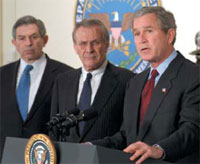
WASHINGTON (FinalCall.com)-As the Bush administration tries to lay to rest questions about bad intelligence reaching all the way up to the President’s State of the Union speech last January, intelligence experts are now lining up to discredit the administration’s motives, as well as the unreliable information it used to justify its war against Iraq.
The specter of an atomic “mushroom cloud” caused by an exploded Iraqi nuclear weapon for example, which was cited by Mr. Bush and other administration officials if the government of Iraqi President Saddam Hussein was not immediately toppled from power, was “deliberately exaggerated” to mask another reason for going to war, two former intelligence officials, along with Rep. Dennis Kucinich (D-Ohio) told reporters July 15.
“That’s what happened, starting at the end of August, all through September, right up until the vote (in Congress to authorize the war) on the 11th of October,” Ray McGovern, a 27-year veteran of the CIA, and now a steering committee member of Veteran Intelligence Professionals for Sanity, told reporters. “The only thing they had was this ‘mushroom cloud’ scare, and the only ‘evidence’ to support that, was this fraudulent information about (Iraq trying to obtain uranium from) Niger” in West Africa.
When Andrew Wilkie resigned from his position as a global terrorism and weapons of mass destruction (WMD) analyst in Australia’s Office of National Assessments last March, he declared then that he was confident from what he’d seen, “that Iraq didn’t pose a serious enough security threat to justify war, that too many things could go wrong, and that it was a dumb policy, because there were other options short of war to be exhausted.
“When I said that Iraq didn’t pose a serious enough security threat, I offered the judgments then, about a week before the war, that based on the intelligence I was seeing, there was no doubt that Iraq’s conventional military was weak and no threat to anyone; that its weapons of mass destruction program was–as I described it at the time–disjointed and contained, and a long way short of the national program that Iraq had in place prior to the ’90-’91 war; and also that I saw no evidence of active cooperation between Iraq and al-Qaeda.
“The case for war,” Mr. Wilkie continued, “seems to have been based on shoddy intelligence, hyped intelligence and even false intelligence. They put a spin on the intelligence and a spin on the truth.”
Sadly, all three men insisted, the truth about this misuse of information is being withheld from the public in this country, in Australia, and in the United Kingdom.
Then, was there a coordinated campaign to mislead and deceive world public opinion? “Yes. I’d say it was a no-brain-er,” said Mr. McGovern.
Mr. Kucinich and Mr. Wilkie agreed. Many members of Congress, said Mr. Kucinich, “relied in good faith” on the administration’s misinformation, on “bad intelligence, false and misused intelligence,” and that false information “infected the debate in Congress, which led to the approval of the Iraq resolution. We were told that there was a nuclear threat. And all of this information that we were told proved to be false,” Rep. Kucinich said.
As an example, when Defense Secretary Donald Rumsfeld told the House Armed Services Committee on Sept. 18, 2002, that President Hussein “has at this moment stockpiles of chemical and biological weapons and is pursuing nuclear weapons,” there was absolutely no hard evidence to support that claim. “I would characterize that statement like many statements over the last many months, as a gross exaggeration to justify a war that was going to occur for other reasons,” Mr. Wilkie said.
The worst case scenario, Mr. Wilkie continued, was “that Iraq has an interest in reconstituting its nuclear program, but in fact, there is no hard evidence that it actually is. And there is hard evidence that although Iraq is rebuilding a number of dual-use facilities that could be used for the chemical and biological program, there was not enough hard evidence to say unequivocally that those programs had reached maturity again, and in fact, were resulting in the weapon-ization of chemical and biological agents.”
Mr. Wilkie, a 20-year veteran Australian Army officer who rose to the rank of Lt. Colonel, confirmed the assessment, reported by The Final Call, from former UN weapons inspector Scott Ritter that any weapons that Iraq might have managed to hold on to after their military was devastated in the 1991 Gulf War, and, after seven years of U.S. over-flights and stringent UN weapons inspections, were probably useless.
“It’s important to understand here that the issue of unaccounted for weapons has been misused in building the case for war,” Mr. Wilkie said in response to a question from The Final Call. “The Iraqis themselves did not know exactly what they had produced, did not know what they had used during the Iran-Iraq war, and could not say exactly what they had destroyed.
“As Scott Ritter quite rightly said, most of that would have turned to mush, since the Iraqis were notoriously bad at purifying their chemical and biological agents. Because of that, it is certain that all of their agents, except mustard gas, would have deteriorated to mush before this last war.”
In addition, Mr. Wilkie pointed out, the claim made before the UN Security Council by Secretary of State Colin Powell, that Iraq had not accounted for 550 artillery shells loaded with mustard gas, was also greatly exaggerated. “As an ex-military person, I can tell you that 550 rounds of mustard is one good fire-mission against one target–once. It is not this massive arsenal of WMD that was a threat not only to the region, but a threat to the United States.”












